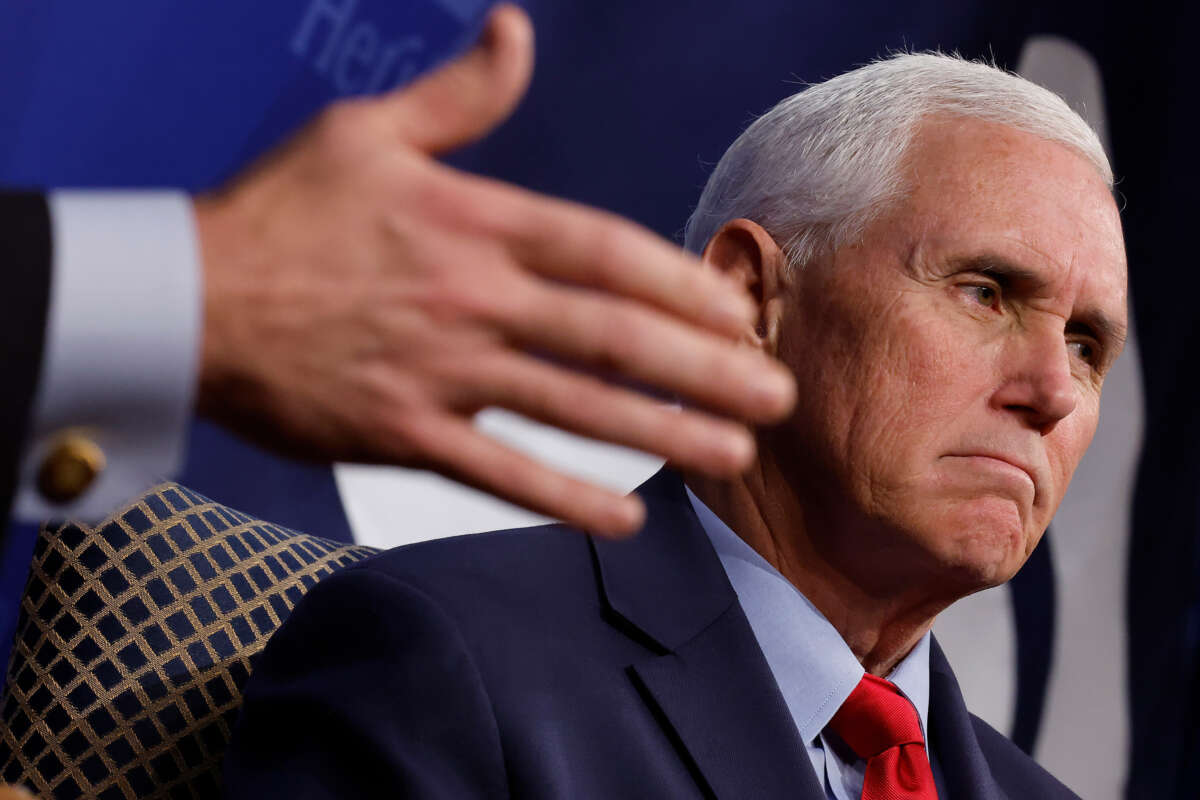A federal judge has ruled that former Vice President Mike Pence must testify before a Justice Department grand jury in an investigation examining efforts to overturn the 2020 presidential election.
Pence was subpoenaed by special counsel Jack Smith in February to testify on the plot to overturn the election and former President Donald Trump’s actions surrounding January 6, 2021 — the day a mob of his loyalists breached the Capitol building to disrupt the certification of President Joe Biden’s election win.
Two efforts to block Pence’s testimony were under consideration by U.S. District Judge James “Jeb” Boasberg. In one, lawyers for former President Donald Trump argued that Pence shouldn’t have to testify because doing so would violate Trump’s executive privilege — the legal doctrine stating that presidents retain the right to keep conversations with advisers from being made public or being accessed by the other branches of government.
In the other, Pence sought to block his own testimony, arguing that because he was vice president during the Trump campaign’s efforts to overturn the election, he was also, constitutionally, the president of the U.S. Senate — and therefore is protected from divulging information to the grand jury based on the Constitution’s “speech or debate” clause, which stipulates that communications between lawmakers in Congress are privileged.
According to accounts of Boasberg’s rulings, which haven’t yet been made public, the federal judge rejected Trump’s argument outright. Boasberg also rejected most of Pence’s argument, saying that Pence can remain silent on some topics pertaining to his work as president of the Senate, but not others — including conversations related to alleged “illegality” on Trump’s part.
Pence has not said whether he will appeal the ruling from Boasberg, but he has previously indicated that he would take the issue all the way to the Supreme Court if allowed to do so.
In an interview with Newsmax’s Greta Van Susteren after the ruling, Pence said that he would make a decision about an appeal “in the coming days.”
“We’re currently speaking to our attorneys about the proper way forward,” he said.
Trump could also technically appeal Boasberg’s ruling against him, but other appeals based on Trump’s executive privilege claims have failed, as Los Angeles Times senior legal affairs columnist Harry Litman pointed out on Twitter.
“That argument by now is really a well worn loser,” Litman wrote, noting that an appeal by the former president “would delay things, but I think not for very long.”
Legal experts have speculated that Pence, who is likely to announce a run for president in 2024, is primarily trying to avoid testifying to appear strong against the Biden administration’s DOJ — a stance that would likely appeal to the Republican party’s increasingly far right base.
“This feels to me more like Pence trying to maintain political support by not cooperating with the 1/6 special counsel investigation than a strong legal position,” Citizens for Responsibility and Ethics in Washington (CREW) president Noah Bookbinder said in February.
Legal experts have expressed skepticism that a Pence appeal would be successful. In response to Boasberg’s orders on Tuesday, former federal prosecutor Joyce Vance described Trump’s strategy of using executive privilege claims to block Pence from testifying as “thoroughly done.” Pence’s argument also appears to have been shot down, she said.
“Even if Pence and perhaps Trump pursue an appeal, it looks like the die is cast here and he will end up having to testify,” Vance said on MSNBC Tuesday night.
Our most important fundraising appeal of the year
December is the most critical time of year for Truthout, because our nonprofit news is funded almost entirely by individual donations from readers like you. So before you navigate away, we ask that you take just a second to support Truthout with a tax-deductible donation.
This year is a little different. We are up against a far-reaching, wide-scale attack on press freedom coming from the Trump administration. 2025 was a year of frightening censorship, news industry corporate consolidation, and worsening financial conditions for progressive nonprofits across the board.
We can only resist Trump’s agenda by cultivating a strong base of support. The right-wing mediasphere is funded comfortably by billionaire owners and venture capitalist philanthropists. At Truthout, we have you.
We’ve set an ambitious target for our year-end campaign — a goal of $250,000 to keep up our fight against authoritarianism in 2026. Please take a meaningful action in this fight: make a one-time or monthly donation to Truthout before December 31. If you have the means, please dig deep.
